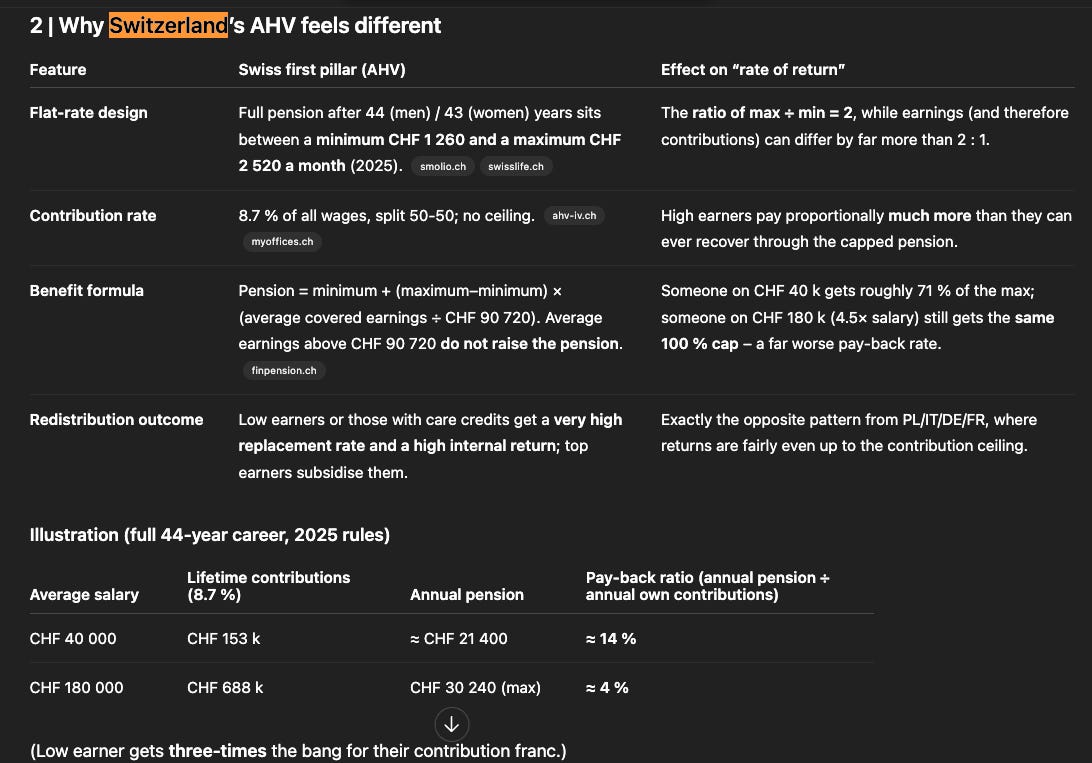Is Poland's ZUS the best social security program in Europe?
I usually don't like pension systems, but Poland one ain't bad
EDIT: Check out also this article where Poland ZUS is compared to other systems in Europe
Poland is one of the best countries for devs in Europe right now.
That’s why I researched its social security system, to see what happens to the money you pay in social security.
Social security can be considered part of the the overall taxation: it’s money that it’s taken out from your revenue or salary, to pay for ‘welfare stuff’.
To learn more about taxes in Poland, check out this article.
ZUS
ZUS is Poland social security pillar, which includes pension contributions as well as disability, accident and labour insurances.
Depending on the person, some people include the health insurance when talking about ZUS, others talk strictly about ZUS (and keep mandatory health insurance separate).
In this article, I’ll focus on ZUS without health insurance.
So, before I start, 2 words on health insurance:
Health insurance contributions aren’t very high in Poland, and the quality of public healthcare depends on where you live (Warsaw/Krakow/Gdansk/Wroclaw vs small town) and what you need (routine check done fast vs important surgery).
For self-employed individuals (majority of high-paid devs in Poland) health insurance (called NFZ) contributions are
180 eur/month to 325 eur/month.
Meaning ~2160-3900 eur/year.
Basically, less than 4% if you’re making ~100k eur or more.
Private health insurance in Poland is inexpensive and high-quality, and most people in tech have one, to pair with the public healthcare. Usually it goes like this:
Private healthcare for basically everything: from same week/day doctor appointments to surgeries.
Public healthcare for serious operations and/or cancer treatment etc.
Goal of the article - focus on pension
Going forward, we’ll focus on how much of your Polish social security contributions ends up in your pension account, and how much you’ll receive at retirement.
ZUS - What you pay
Self-employed (sole proprietorship / single-member Sp. z o.o.)
Monthly out-go for pension: PLN 1,015.78 ≈ €231
Total social security (pension + disability + accident + labour): PLN 1,646 ≈ €375
Annual social max cap for ZUS: ≈ €4,500 (€375 * 12)
Employee
19.52% of wage (shared 50-50 with employer). Example: PLN 12,000 gross → worker pays PLN 1,171 ≈ €266
Ceiling at PLN 260,190/yr (≈ €60,000)
How much of your ZUS goes to pension?
62% of the Polish social bill goes to pensions.
The rest buys disability, accident and labour-fund cover.
Comparison with other countries (to take with a grain of salt as I haven’t researched it deeply):
Italy sends 87% to pensions, Germany and France about 46–47%.
It could be that Italy is high because some other things you pay separately.
How ZUS grows your pension contributions
Rule: every 1 June your whole pension balance is multiplied by last year's payroll growth (basically, Poland’s average salary growth): in 2025, it was 14.41%.
Over the past 30 years Polish wages have grown close to 9% a year.
Assumption for the future:
≈4.3% nominal wage growth a year for next 30 years (source)
How much you’ll get in pension
This will depend on how long you live, since how much you’ll get depends on:
How much you paid
How much it has grown
Divided by how many years you’re expected to live (79 years for Poland in 2025).
If you live to life-table age (≈ 79):
Your yearly return on your pension money (nominal Internal Rate of Return (IRR)) will be 2.7%
If you live life-table age + 5 years:
3.5% nominal IRR
If you live life-table age + 8 years:
3.8% nominal IRR
Growth inside ZUS is tax-free;
Most retirees stay below the Personal Income Tax (PIT) allowance on benefits (no tax on the pension you receive).
Let’s compare this growth to investing in bonds
Example: you invest the same euro each year in a ladder of new 30-year US Treasuries at a steady 4.8% yield.
IRR: ≈ 4.8% nominal before tax → ≈ 3.9% after 19% Polish PIT on coupons (capital-gain tax if sold early).
Comparison after tax:
3.5–3.8% yearly return from ZUS (live 5–8 y longer than 79)
≈ 3.9% yearly return from Treasuries
The gap is slim; ZUS carries zero reinvestment or inflation risk, and payments last for life.
How other large EU systems compare
Poland
Crediting rule (how they grow your contributions): tracks wage growth
Nominal IRR (life-table): 2.7%
Pension slice on payroll (for FTE - paid by both employees and employers): 19.52%
Self-employed cap (usually both min and max cap, i.e. fixed amount): €4,500
You’ll now notice how other countries have a lower IRR.
This is mostly due to the fact that a country’s pension returns are usually tied to wage growth (new generations pay pension for older ones), and to the fact that these countries have lower forecasted avg wage - but also GDP - growth.
Italy
Crediting rule: 5-yr avg GDP
Nominal IRR (life-table): 1.6%
Pension slice on payroll for FTE (Full-Time Employees): 33%
Self-employed cap: €29,000
France
Crediting rule: Tracks Wage growth and subtracts 0.2 pp to compensate for low birth-rates
Nominal IRR (life-table): 1.6%
Pension slice on payroll for FTE: 23%
Self-employed cap: €30,000
Germany
Crediting rule: Wage – 0.3 pp
Nominal IRR (life-table): 1.4%
Pension slice on payroll: 18.6%
Self-employed cap: €18,000
Switzerland
Crediting rule: Flat benefit cap
Nominal IRR (life-table): only good for low earners
Pension slice on payroll: 8.7% (no ceiling)
Self-employed cap: none
Switzerland works a bit differently
Basically, the pension people receive is kind of fixed (small range of difference), but the contributions are proportional (8.7%), meaning it’s good for low earners (contributing little but getting the lower bound of the range which ain’t too low - about 1300 eur/month today) but not so good for high earners (especially past 200k+, which is not that high for Switzerland cost of living) because they get the max of the band, which is not that high (~2600 eur/month in 2025).
Here’s more info:
In Switzerland, there’s also other pension pillars, none of them mandatory if you’re self-employed (although can be useful as tax deductibles), and some of them mandatory if you’re a full-time employee (with your employer topping up your contribution).
If you’re interested, I can do a deep dive on the tax/social security system of Switzerland, or you can check out this or this other article to learn more.
But, in short:
Poland's mix of high ‘interests’ and very low ceiling on contributions is hard to beat.
Basically:
You don’t pay a lot in social security: low cap (4500 eur/year for self-employed).
A lot of what you pay goes into pension (~60%) while the rest goes in the regular insurances (IMO, still a nice too have for 1800 eur/year: to protect yourself from worst case scenarios and live in a society where people in need receive help).
Your pension contributions grow at roughly 4% per year thanks to the rapid wage growth (younger generations in Poland will contribute more than you, because wages keep growing, and you’ll get good interests on what you paid).
As an individual, you share the successes/failures of the country you’re living in:
Risk factors and why they look manageable
Policy risk:
Any parliament can trim indexation or raise retirement age.
Demography:
Fewer workers would slow payroll growth.
Mitigants:
Poland has added > 1 million young Ukrainians since 2022 and is a net magnet for labour (thanks to a growing economy, high standard of living and safety).
→ this supports both the wage bill and the contributor base
Key points to remember
Cost-effective – a freelancer pays < €4.5k a year for the entire social bundle; €2.8k of that is the pension slice.
Competitive return – wage-linked growth gives 3%-plus nominal IRR if you live even slightly longer than average; tax-free while it accrues.
Low contribution ceiling – high earners keep almost all additional income, unlike in France, Italy, Germany or Switzerland.
Automatic longevity hedge – the longer you live, the closer (or higher) your after-tax ZUS return comes to a long US Treasury.
Poles may complain about ZUS, but for anyone targeting high pay in Europe’s tech-market, the numbers suggest it is fair value for money.
And, in risk-adjusted terms, better than many "safe" market alternatives.
PS: self-employed vs full-time employees
In this article, I somewhat focused on self-employed individuals, since many devs in Poland work as freelancers.
That said, I also highlighted the ZUS rates for employees.
As you have seen, the max cap on ZUS for employees is higher than for self-employed people.
This means that you can end paying more, which is not good for most people.
But, there are also 2 advantages":
Your employer matches your contribution (basically it’s almost the same as ‘getting more money’ in addition to your paycheck) - btw it’s like this in most countries.
Your pension contribution will still grow at the high rates we discussed in the article! (unlike most other European countries :)).
Therefore, Polish big tech engineers (who almost always need to work as full-time employees), don’t despair!
Not only your RSU will be taxed at a flat 19% rate (very nice), but your social security contribution will also be very well invested!
You’re likely to end up with a very fat pension.
Last but not least, you also have the possibility to take mortgages easily and get your share in a real estate market with a lot of potential and steady growth.
This article now has a part 2!
Check it out here
This article is brought to you by:
Euro Top Tech Jobs - The #1 resource for landing Top-Paying Tech roles in Europe:
4000+ top paying tech jobs in Europe from big tech companies, HFT firms and high-paying scale-ups.
Hundreds of jobs from 100+ fully-remote companies paying $100-600k per year.
Private guides - like this one - to help you land these jobs.
Six Figure Euro Engineer - Maximise your chances to boost your Tech Career in Europe, reducing time to success:
Work 1:1 with me (Nicola Amadio, author of this newsletter), and join the other engineers who were able to 10x their tech career in the past few months!




